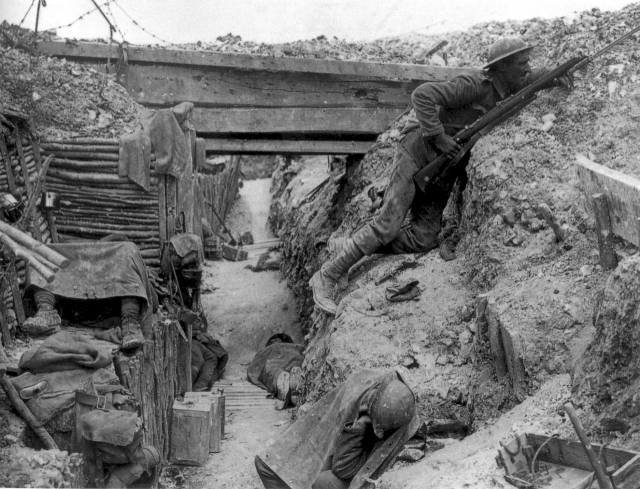The start of the First World War

From the 28 June 1914 till the end of July 1914 the world held its breath; would Europe be thrown into war? We now know that the answer was yes.
Diplomacy had failed, some would say it never really stood a chance, others will argue that nothing was inevitable until the actual start of August. On 1 August 1914 Germany declared war on Russia and the network of treaties and alliances that connected the European powers began its pull. On 3 August German and France
declared war on one another and Belgium refused an ultimatum to let German troops to march through it's territory. After the German threat to Belgium, Britain also threw in her lot in and on 4 August the First World War began for Great Britain, with the expected knock on affect in the Empire and across the Dominions (now the Commonwealth countries).
Although Britain did not have territories in Europe it felt the threat from Germany in certain other areas of influence for example in the Ottoman Empire and Africa. On this site Professor Gary Sheffield argues that the war was a just and necessary one, against a militarist aggressor (Germany), in contrast Professor Sir Richard J. Evans argues that Germany and Britain were friends and not destined to war. This is just the beginning of academic debates
that will continue for the next four and half years.
One hundred years later and the outbreak of war in the summer of 1914 continues to garner so much interest and debate. Perhaps this is less remarkable when we remember the war's reach for Britain - approximately six million men were mobilised through the British forces, millions more men and women entered into war work, women were near the front line in an official capacity for the first time, local communities would be changed forever along with
attitudes and ideals.
Over the next few years the HA will bring you articles and learning materials about the war. We will provide guidance on the materials that we can already see appearing on websites everywhere. We will keep you up-to-date on the twists and turns that the commemorations of the centenary are going through and we will remember with you the events and people of that time.
It is worth reflecting that at the start of August 1914 the horror and heroism that was to mark the war was not known. Hindsight is a wonderful thing if we wish to remark on folly or judge decision making from afar, but when war was declared it was met with a flurry of support and thousands of volunteers. Maybe some had a
feeling for the devastation that was to come, one politician, Sir Edward Grey, the foreign secretary, is reputed (though some dispute this) as stating, to his friend John Spender, the editor of the Westminster Gazette:
"The lamps are going out all over Europe; we shall not see them lit again in our lifetime,"
One hundred years later we are still seeing the legacy of that darkness but maybe we have an opportunity to learn from it all again.

